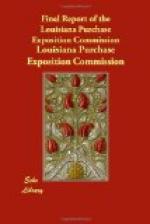Up to the end of the revolution the possession of the Louisiana Territory by one foreign power or another had not touched Americans closely, but now conditions changed. When rumors of the last treaty finally reached the United States, the planters in the Mississippi Valley became alarmed. The laws and customs regulations of the Spaniards at New Orleans were arbitrary, and their business methods antiquated, complicated, and irksome to the colonists, and there had already been friction between them, the Spaniards being aided by Indians hostile to the frontiersmen. The right of deposit was essential to the pioneers who journeyed down the river in their flat-bottom homemade boats; they required a place to store their goods at New Orleans while waiting the arrival of trading vessels. In the early nineties the Spanish authorities closed navigation and refused the right of way to the ocean, but in 1795 a treaty was signed which gave the right of deposit, with certain minor limitations, for three years, and the way to a market was kept open for that period, and thereafter until 1802; that year the Spaniards again withdrew the privilege, and therein lay a potent motive for the acquisition of at least the mouth of the Mississippi River, and, although the immediate demand of these early American settlers was simply an open seaport and waterway to the sea, the Louisiana Purchase was the direct outcome of our strained relations with Spain.
A resolution was offered in Congress authorizing the President to call out 50,000 militia and take possession of New Orleans, but the United States sought security, and a substitute resolution was adopted appropriating $2,000,000 for the purchase of the Floridas and New Orleans, the Floridas being at first the entire cession contemplated, even without the island of New Orleans. The chancellor, Robert R. Livingston, had been appointed as our minister to France at a time when the affairs of that country were in a somewhat precarious condition. Napoleon, then only 34 years old, was dictator, surrounded by enemies. President Jefferson wrote Livingston to make the best terms he could with Napoleon, either for the mouth of the river, site for a city, or place for deposit. He at no time spoke of acquiring the whole tract. Livingston, with great tact and judgment, kept the matter before Napoleon, realizing not only the importance of the small tract originally involved, but the incalculable advantage that would be derived by the United States could the accession of the whole territory be accomplished. He was, therefore, greatly surprised by a question from Talleyrand, in which he was asked “What we would give for the whole tract?” This was followed by a proposition from Napoleon’s representative, Marbois, the state treasurer, in which he offered to sell all the Louisiana Territory to the United States for 100,000,000 francs ($20,000,000), with a provision that the United States should pay the claims of American citizens




